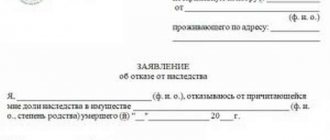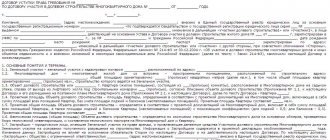You can learn about how to determine whether an apartment has been privatized, where to start the privatization process, how to write an application and whether it can be submitted through the MFC from our articles.
Legal grounds
The legislation of the Russian Federation clearly defines both the procedure for obtaining the right to certain square meters of housing, and the procedure for renouncing entitlements.
According to Article 11 of the Law “On Privatization...” No. 1541-1, a share in an apartment occupied under a social tenancy agreement is entitled to every citizen registered there, including minors who have not previously participated in privatization (find out who has the right to re-privatization).
The privatized living space can be divided among all residents or some of them, provided that one of the citizens renounces their rights (read who is better to privatize).
Refusal to participate in privatization should be distinguished from disagreement with the process. Disagreement means that someone registered is against transferring the apartment into private hands. In this case, it will be impossible to privatize housing.
Find out on our website what may cause the government services to refuse to privatize your apartment, whether it is possible to privatize official, cooperative housing, a military serviceman’s apartment and an apartment with rent arrears.
Application form for refusal to participate in privatization.
How to issue a refusal?
To formalize the refusal, you must prepare an application and collect the necessary package of documents .
Depending on the requirements of the municipality, notarization may be required.
What will you need?
The package of documents includes:
- Notarized refusal
- Certificates from the passport office
- Extracts from the Unified State Register
- Technical passport with cadastral number
- Documents of all persons participating in the procedure
- Order and social tenancy agreement.
When a minor participates in the procedure, a decision from the guardianship authorities may be required.
There is no single application form. The document can be written by hand or typed on a computer. The form reflects the personal data of the “refuser”. Residential address. The person writes that he refuses to receive a share of the privatized housing, this is agreed upon with other people living in the apartment (house).
It is stated that the refusal was carried out on a voluntary basis and without pressure.
Step by Step Actions
- Collection of documents
- Notarized certification of the refusal for maximum security of the procedure
- Submission by other residents of documents with a “refusal” for privatization to the BTI, Department of City Property Management
- Entering data into Rosreestr
- Issuance of certificates of ownership
Certification of the contract
An application with a refusal does not need to be certified unless required by government agencies. But lawyers recommend certifying the document for the safest execution of the entire procedure.
Causes
Why do citizens refuse their share? The motivation for refusing to participate in the process can be different. The most common reasons are:
- Reluctance to incur extra costs for maintaining a living space and paying taxes on it. Since after the housing is transferred into private hands, all expenses for repairs and maintenance of the apartment fall on the shoulders of the owners, costs inevitably increase. To free themselves from unnecessary expenses, many citizens prefer to live in municipal housing.
- Refusal in favor of family members . In such cases, the share of each family member participating in the process increases.
- For facilitating alienation procedures privatized real estate subsequently. For this reason, most often the apartment is registered as the property of one family member, who will subsequently sell it.
Reducing the number of shareholders significantly simplifies the process of registering both the privatization itself and the subsequent sale of living space. - Intention to take part in the privatization of other housing .
This motivates the refusal if a citizen applies in the near future to receive social housing of a larger area.
You can learn about the concepts of paid and free privatization, as well as what tax the owners of privatized apartments are required to pay and what they must repair at their own expense on our website.
Who has the right to refuse privatization?
, people registered in municipal housing, which is rented under a social tenancy agreement, can refuse privatization .
The law provides for cases when refusal can be made by people who, for good reason, do not live in the apartment:
- prisoners in prison;
- soldiers ;
- people working on a rotational basis in the Far North.
People living in such housing temporarily do not participate in the registration of property.
Who will get it?
How to give up a share in a privatized apartment in favor of your parents? Many citizens have a misconception that by giving up their share, they can transfer the rights to it to a specific person .
This is not true. The procedure involves an actual refusal to participate in privatization, that is, in dividing the total area among all residents .
If one of the registered persons refuses the allotted squares, they are evenly divided among all remaining participants. It is impossible to draw up a document indicating a specific person to whom the refusenik wishes to transfer his square meters.
How to renounce a share in a privatized apartment in favor of the mother?
If one of the family members wants his share to go to a specific person, it is necessary to take part in privatization and then issue a deed of gift for it.
Find out from our articles about what the statute of limitations is for invalidating the privatization of an apartment, as well as how to go through the process of deprivatization of residential premises.
What does the law say?
Despite the refusal to register property, everyone registered has the right to use the living space.
An exception is the case when a person divorces the owner of the apartment, then he cannot continue to use the housing unless there are additional agreements between them.
But this situation is twofold because, according to another law, a person who refuses privatization in favor of a second person living in the apartment cannot be evicted. This right is unlimited .
In these cases, the Supreme Court takes the side of the person who wrote a waiver of his share during privatization, despite the contradiction of two different legal acts.
Document requirements
Refusal of privatization is an official document , which is drawn up and certified in full compliance with the legal norms of the state. To draw it up, you need to contact a notary at the location of the apartment or in any convenient place.
If a citizen registered in an apartment is in another city, he can issue a refusal at the place of his temporary stay. Registration takes place in person upon presentation of a passport. The citizen writes a statement in which he must indicate the following information:
- Personal data – full name, date of birth, passport details, place of registration.
- Data on living space - type of property and its address.
- Motives for refusing a share.
The document is certified by the signature of the applicant or his authorized representative, if privatization is carried out by proxy (read about privatization through a realtor).
When registering, you must pay a state fee in the amount of 500 to 1000 rubles, and present a receipt to the notary.
The notary certifies the refusal with his own signature. From this moment on, the refusal is an official document and is attached to the package of papers submitted for the procedure.
If a citizen registered in an apartment has previously participated in the privatization of another home , there is no need to draw up a document.
You can find out whether it is possible to privatize a share in an apartment, as well as a room in a dorm or communal apartment, on our website.
Read more about the refusal of privatization
Privatization of state or municipal housing is regulated by Federal Law No. 1541-1 . Residential space can be registered as personal property only with the consent of adults and minors aged 14 to 18 years living on the property .
An apartment or house may have several owners or one owner. The procedure can be done once for free, privatizing the living space.
After the procedure has been completed, any transactions can be carried out with housing according to the law: sell, donate, inherit, rent to tenants, etc. The owners are also responsible for paying taxes.
Sometimes several people are registered in an apartment and one of them decides to refuse the privatization procedure. In this case, the share of the person who refused is transferred to the ownership of the people registered in the apartment.
Features of registration on behalf of minors
According to the law, a waiver on behalf of a minor citizen can be issued only if he is already 14 years old . A necessary condition for such an action is the presence of permission from the guardianship authorities.
In this case, a person under 18 years of age is explained all the consequences of refusal and the prospects that open up when receiving their own square meters. To obtain the consent of the guardianship authorities, there must be serious motives for depriving the child of a share .
If the apartment is privatized for subsequent sale, renunciation of the child’s name is necessary , since the apartment with a minor’s share in it cannot be sold.
After the sale, parents will be required to buy a new home, the child’s share in which must correspond to the size of the part in the old one . Otherwise, the refusal will be canceled and the apartment will be returned to municipal status.
If there is permission from the guardianship authorities, in accordance with Art. and the Civil Code of the Russian Federation, a notarized waiver on behalf of the child is not required. To obtain permission, you need to write an application and attach the following documents to it:
- parents' passports;
child's passport;- certificate of those registered in the living space;
- rental agreement, warrant (if available).
The application is written in the prescribed form, available as a sample in every department of the guardianship authorities of the Russian Federation.
Particular attention should be paid to the motivational part , since in order to make a positive decision, guardianship staff must be sure that the child will not end up in worse living conditions.
The guardianship authorities have 10 days to make a decision. After this period, one of the parents receives a document that can be attached to the package of papers for privatization.
It is impossible to deprive a child under 14 years of age of a share in a privatized apartment; according to the law, he must become the owner without fail .
Find out on our website how to achieve recognition of property rights through the court.
General points
Often the privatization of living space is carried out with the shared participation of relatives. This option is not entirely profitable for apartment owners.
Subsequently, housing will be problematic to manage, it will be difficult to sell or rent it out.
In such a situation, many decide to refuse privatization in favor of one of their relatives or strangers. Most often these are parents.
Minor children cannot refuse privatization in favor of their parents. The board of trustees will not agree to this action, since the living conditions for the baby will become worse.
In accordance with the law, parents are first-degree relatives. They are among the first persons to whom responsibility for property privatization can be shifted.
The law does not prohibit writing a refusal in favor of the father or mother. It does not matter whether they are registered in this apartment or not.
The reasons for refusing privatization are:
- desire to expand the area;
- increase in property taxes;
- the opportunity to receive benefits and subsidies from the state.
There is no set form of refusal. In the document indicate:
| Applicant details | Passport information, residential address |
| Request | Do not include it in the list of privatization participants |
| Apartment location address | — |
| Reason for refusal | Indicate the details of the person in favor of whom the applicant is refusing |
The refusal is written by a notary in the applicant’s area of residence. The legislation provides for several ways to refuse privatization:
| Donation | A person transfers his apartment to a third party - his parents. Usually this process goes smoothly. You just need to re-register your property rights |
| Do not participate in privatization | It is necessary to issue a written refusal from a notary and have it certified. However, this option does not provide for the transfer of housing to another person |
| Give up property | — |
It is possible to refuse privatization of housing in favor of mom and dad only if no other persons are registered in the apartment.
To formalize the refusal, you must write an application and have it certified by a notary. A sample can be found at any notary office. The application is then submitted to the Housing Department.
You will also need documents - a passport and its photocopy, a warrant for living space or a rental agreement, a certificate of persons registered in the apartment.
If children want to file a waiver in favor of their parents, they must do so before privatization. The refusal is issued by each registered child separately.
In this case, they will be the only applicants for housing and will be able to formalize ownership rights.
If the child has not reached the age of majority, then it is almost impossible to issue a refusal. It is necessary to obtain the consent of the guardianship authorities.
The refusal procedure has positive and negative aspects. The benefits include:
- lifelong right to reside in this apartment;
- there is a high probability of getting another housing;
- receiving living space from the state (if the person was in line).
The disadvantages are possible misunderstandings with other relatives; living conditions will be similar to a “communal apartment”. However, they cannot evict a refusenik.
You will have to pay for refusal. The cost depends on the prices for notary services. Included in the price:
| Notary fee | Its size is established by law, therefore it is the same in all regions |
| Cost of technical and legal work | The coefficient is almost the same for all notaries, but may vary slightly |
To calculate the exact cost of registering a waiver, you must visit a specific notary.
What it is
Privatization is the right of any citizen to receive real estate from the state free of charge.
Refusal of privatization is the consent of a person in writing to refuse to acquire ownership rights to the housing in which he is registered.
Only an adult child has the right to refuse privatization in favor of his parents.
For what purpose is it carried out?
By privatizing housing, citizens have a lot of additional opportunities. Citizens have the right to carry out the procedure only once in their lifetime.
For step-by-step instructions on how to create a HOA in an apartment building in 2021, see the article: how to create a HOA in an apartment building. What is the period for personal income tax compensation when purchasing an apartment? Read here.
After privatization, a citizen has more rights to an apartment than living under a rental agreement. In privatized housing, redevelopment and reconstruction can be carried out.
Such an apartment can be sold, donated or bequeathed. Why do citizens issue a refusal to privatize in favor of other persons?
If the apartment remains the property of the municipality, then the persons registered in it use it as social rent. No one has the right to forcibly take away this premises from them.
Another reason for refusing privatization is the unsuitability of housing. Living in a non-privatized apartment has one nuance - community.
By refusing privatization, a citizen loses the right to dispose of some property in the form of a share, but has the right to live in this apartment for the rest of his life. Only adult children have the right to formalize a refusal in favor of their parents.
Legal regulation
The privatization process is regulated by Law No. 1541-1 “On Privatization,” adopted on July 4, 1991. The program has been extended more than once.
According to the latest changes adopted in February 2021, the procedure was extended until 2021. Relinquishment of property is provided for in Article 236 of the Civil Code.
The right of a person who refuses to live in an apartment for life is regulated by Article 83 of the Housing Code and Article 292 of the Civil Code. A refusal can only be challenged by a court decision.
The reasons for this are:
| The citizen was declared incompetent | Article 171 of the Civil Code |
| The citizen was not aware of his actions | Article 177 Civil Code |
| The person who refused was misled | Article 178 Civil Code |
| A citizen signed a refusal under pressure | Article 179 Civil Code |
Rights of a refusenik
A citizen who intentionally deprives himself of a share has the right to live in the apartment for life. He retains registration and the right to reside in it even in the event of sale. In addition, this person retains the right to privatize another apartment subsequently.
A person who has renounced a share cannot be expelled from the apartment without consent, even if the family relationship with the owner ends.
This applies, for example, to a former spouse who at one time ceded his rights to his second half.
The tenant who renounces his share and continues to live in the apartment is obliged to pay housing and communal services on an equal basis with the owners. The absence of a share does not mean that he is exempt from payments.
You can learn about the rights and responsibilities of the owner and those prescribed in a privatized apartment from our article.
Is it possible to cancel a refusal?
Giving up your housing share is a voluntary decision. But due to some circumstances, a person can change his mind. Once a waiver is issued, it is difficult to challenge it . To revoke it, it must be proven that the person’s financial situation has significantly worsened due to this action. Revocation can be carried out until the authority is granted to Rosreestr.
If there was no staging, privatization is terminated.
In which case?
The “refusal” is contested by contacting the notary to cancel the certification or through legal proceedings if the notary refused.
Judicial practice shows that only proof that the refusal was made due to delusion or coercion “works.” If the court sides with the applicant, the privatization is declared invalid.
Much depends on the lawyer and the plaintiff, who can or cannot prove the illegality of the transaction or violation of rights.
Consequences
By signing the document, the citizen deprives himself of the right to dispose of the apartment. From the moment of privatization, he can only reside in this territory . However, he will no longer be able to perform the following actions:
- Sell, bequeath, donate your share.
- Register your family members and other persons in the apartment without the consent of the owners.
The only exceptions are minor children, who are registered at the place of residence of their parents automatically, without obtaining consent.
The signing of this document may result in trouble in the event of the proposed sale of the apartment.
If the owner decides to sell the apartment, he can do so without obtaining the consent of the objector registered in it.
In this case, complete strangers may become the owners of the apartment, and the person registered will have to live in the apartment with them.
The right to live in an apartment ceases from the moment when the refused citizen is discharged and receives another social living space or takes part in the privatization of other housing.








